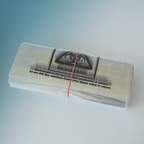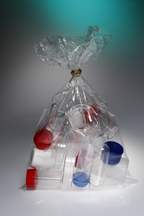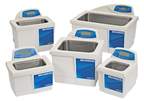Autoclaving, Sterilisation and Lab Washers
Greiner Bio-One™ Polypropylene Clear Disposal Bags
Made of polypropylene foil for sterilization in the steam autoclave. Greiner Bio-One™ is ideal for the hygienic disposal of contaminated laboratory items.
Miele Professional™ Lab Washer
Analysis grade conditioning of laboratory glassware.
Fisherbrand™ Glass Beaker with Cover
The Fisherbrand™ Glass Beaker with Cover is an ideal accessory for the Fisherbrand™ 11211 ultrasonic cleaner. This is a safe and economical choice for any laboratory.
Branson Ultrasonics™ MH Series Heated Ultrasonic Cleaning Bath
Outfit your lab with an industry classic. Branson Ultrasonic Tabletop Cleaners offer rock-solid construction plus a hi-tech design and will provide you with years of reliable use.
Corning™ Autoclave Bags Printed with Biohazard Logo
Used for contaminated waste disposal in autoclave. Gosselin™ Autoclave Bags Printed with Biohazard Logo can withstand autoclaving temperatures up to 134°C/273.2°F.
Steris Corporation™ Plain Top Closure Pouches
For use in porous load pre-vacuum autoclaves as well as gamma sterilizers. Steris Corporation™ Plain Top Closure Pouches include a double folded bottom seal for extra integrity.
Branson Ultrasonics™ Bransonic™ Ultrasonic Cleaning Bath Accessory, Perforated Trays
For use with Branson ultrasonic baths
Socorex Qualitix™ Sterilization Pouch
Fits any small to mid-size sterilization device and provides easy and effective wrapping of items. Made of robust medical grade paper, they tightly close with self-sealing strip to maintain sterility. Content remains visible through PET/CPP transparent laminated film.
Miele Professional™ Injector nozzle
Injector nozzles ID 220 with plastic supports, Ø 6, length 220 mm
HMC Flexible Temperature Sensor for HV series Sterilization Equipment
For use with HV series Sterilization Equipment.
Miele Professional™ Injector nozzle
Clamps E 354, height-adjustable for optimum positioning of laboratory glassware on the nozzle
Miele Professional™ Injector
Injector nozzle E 351 for the optimum cleaning of the wash items. Size 4 x 160 mm
Corning™ Autoclavable Blender Bags
For autoclaving contaminated products safely
Fisherbrand™ Immersion Basket with Handle
Facilitates complete immersion within S-line Ultrasonic Cleaner baths. Fisherbrand™ Immersion Baskets with Handle are manufactured from stainless steel.
Miele Professional™ Injector nozzle
Clamps E 353, height-adjustable for optimum positioning of laboratory glassware on the nozzle
HMC Europe Vertical Autoclave Temperature Sensors
For the sterilization of liquids. Extremely flexible, mechanically and chemically resistant. Quick response, encapsulated, steam-tight.
Branson Ultrasonics™ M Series Ultrasonic Cleaning Bath
Outfit your lab with a Bransonic MH Series Ultrasonic Cleaner. This unit is designed with solid construction and excellent functionality for a variety of applications − including cell separation, sample preparation and degassing of liquids.
HMC Europe Vertical Autoclave Baskets
With this item you can easily and safely bring your sterilized goods into and out of the autoclave; we offer baskets in various sizes, with and without bowl or closed cans with and without holes.
Epredia™ Sterilin™ Autoclave Bags
Sterilin Autoclave Bags are strong disposable bags with blue biohazard printing specifically designed for contaminated waste disposal in autoclaves or incinerators.
Miele Professional™ Insert
Insert E 106/2 for the optimum loading of wide neck flasks, etc
Miele Professional™ Injector nozzle
Injector nozzles E 352 for the optimum cleaning of the wash items
Miele Professional™ Lab Washer
Analysis grade conditioning of laboratory glassware.
Miele Professional™ Insert
Insert E 139/1 for the optimum loading of test tubes up to 12 x 200mm
Bel-Art™ SP Scienceware™ Clavies™ High-Temperature Autoclave Bags
Withstand high temperatures to reduce autoclave time
Branson Ultrasonics™ CPXH Series Ultrasonic Cleaning Bath
Outfit your lab with an industry classic, heated cleaner that delivers the same ultrasonic power even when load conditions change. Additionally, Branson CPXH Series Ultrasonic Tabletop Cleaners offer rock-solid construction plus a hi-tech design and will provide you with years of reliable use.
Fisherbrand™ Conductivity Sensor
The machine can be equipped with conductivity control.
Miele Professional™ Accessory large washer-disinfector
Closed plinth UE 30-60/60-78 to raise the machine, 60 cm deep, 60 cm wide
![]()
Sterilisers and autoclaves are used in many laboratories, cleanrooms, microbiological facilities and other controlled environments to disinfect a wide range of laboratory consumables and apparatus. Sterilisers may use high pressure, high temperature, chemicals, UV, filtration, or a combination of these methods to eliminate bacteria, fungi, viruses and spores.
What is autoclaving?
Autoclaves are a specific kind of laboratory steriliser. They generate high temperature steam, typically up to 140°C, within a sealed, pressurised loading chamber which can accommodate glassware, plasticware, apparel, equipment and any other items requiring treatment. Prior to loading, objects may first be wrapped inside dedicated autoclave bags or pouches and sealed with special heat-sensitive autoclave sterilisation verification indicator tape that changes colour after successful sterilising conditions have been achieved (typically 20 minutes for most models). Laboratory autoclaves are available as benchtop or floor standing models, with a range of different loading capacities. Most modern autoclaves are also microprocessor controlled, with pre-installed or programmable sterilisation cycles, digital controls, alarms and other safety features. Autoclaves are used for many purposes:
- Sterilisation of glassware, plasticware and other apparatus
- Preparation of sterile cell culture or microbiological growth media
- Sterilisation of surgical instruments or apparel
- Sterilisation of biohazardous laboratory or clinical waste prior to safe and subsequent disposal
Lab washers are designed primarily for cleaning soiled glassware and plasticware, without necessarily certifying sterilisation. They are not normally pressurised, but instead typically rely on hot water sprays or jets and special cleaning liquids for their cleaning action, rather like a domestic dishwasher.



























